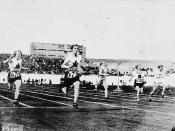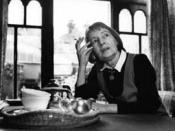Poetry has been described as an "art," and the poem itself partially defined as
having a certain "suggestive power." Many poets have taken full advantage of this
"power" lent to them, and with their pen have set out to master the "art" of poetry in the
form of self-expression and honest revelations concerning their very existence. Perhaps
one of the lesser known but most intriguing women poets in this literary genre was
Florence (Stevie) Smith. While studying Smith's poetic works, the reader is enabled to
enter her world of emotional extremes, where the loneliness and appreciation for her few
sincere friendships closely reflected her own personal life.
Florence Margaret Smith was born September 20, 1902, in Hull, Yorkshire,
England. She lived with her mother and father only until the age of three, when her
father left the family. He established himself as a crewman on the White Star Line and
besides an occasional snapshot or postcard, he took no interest in the family affairs.
Florence, or Stevie (her self-given nickname), then went to live with her aunt in
Palmers Green. She arrived with plenty of emotional baggage and as she grew, she was
never able to fully trust another soul and thus brought upon herself the responsibilities
of planning for her future. She struggled to piece together the painful pieces of her past
in order to satisfy the wishes of her aunt concerning her upbringing as a "proper young
lady." She turned to writing as an outlet for her feelings of loneliness and confusion.
One of her earlier poems, entitled 'Papa Love Baby," describes honestly
her feelings toward her father and his decision to leave the family in the hands of her
seriously ill mother when he grew bored of the marriage. Smith writes that she "wished
mama hadn't made such a foolish marriage...it showed in my eyes unfortunately..."
These feelings of abandonment are evident in most of her earlier works are
characteristic of her poetry and allowed her to bond and relate to her readers. She wrote
with a simple uncluttered honesty that, despite her impersonality, brings the reader to
contemplate their own situations and examine their own inner strengths and weaknesses.
Poetry discussing mother and daughter relationships were of special interest to
Miss Smith in her younger years. Many have speculated that this was because her own
relationship with her mother was close to non-existent. Smith's elderly aunt Margaret
was named her legal guardian. Even though Stevie Smith described her aunt as her
"Auntie Lion," because of her uninhibited boldness. Smith is quoted as saying, "People
think that because I never married, I know nothing about the emotions...When I am dead
you must put them right. I loved my aunt." Her aunt, however, thought her nieces'
writing was unnecessary. Strangely enough, though, Smith almost admired her aunt for
disapproving of her hobby because her she, Margaret Annie Spear, still supported her
niece and encouraged her to succeed in whichever way she chose for herself. Ms.Spear
allowed the writing to continue.
In her poetry, Stevie Smith was quick to point out how much her aunt had done to
help her family survive and how she herself thought she was a burden to her aging aunt.
Smith once stated that, "I am not God's little lamb, I am God's sick tiger." In fact, one of
her later poems describes vividly just how abandoned and alone she felt. Smith depicts a
princess, (representing herself), wandering into a dark forest with the word "FEAR" tied
around her throat. The princess then comes across a stream and stays there and gazes at
herself, where the poem leaves her. Many have come to think that this picture drawn by
Stevie Smith is how she pictured her life in her "forest" at 1 Avondale Road, Palmers
Green, in the enormous private estate of her aunt. Smith was afraid to confront society
but she so wanted to be a part of the "outside world" that she started writing in her own
strange, somewhat adolescent-like, awkward style that allowed her to face her anxieties
and step out into life in the spotlight, where she was taken out her "drabby existence" as
one of her dear friends had once described it.
As she introduced herself to the workings of modern society and expectations
of the contemporary British literature audience, she chose to defy the laws of both
institutions. Smith stated, "I love life, but only because I keep myself well on the edge."
She created her own expectations of life and the style in which she wrote and lived
continued to astonish and refresh her readers.
One of the many odd fascinations that inspired her writing was her hatred of
commitment. She wrote countless school-girl like works discussing her desire to be
"held and kissed." Although she thoroughly enjoyed "having affairs with people and
getting off with them," as she so crudely worded it, she carefully distances any emotion
from these poems. She talks about them without sentiment as though she had heard
about the events from an account of another person. She claimed that literature should be
free of "all its whimpering lovey dovey get-all-together." Stevie Smith motivated a whole
new genre of writing characterized by extreme honesty and the dismissal of all
responsibility that comes with the open expression of personal views and opinions.
Another example of Smith's distaste for commitment is in her discussion of her
friendships and frequent lack there of. The following lines from her poem entitled
'The Pleasures of Friendship' describes her visit to a friend's home.
The pleasures of friendship are exquisite,
How pleasant to visit a friend on a visit!
I go to my friend, we walk on the grass,
And the hours and moments like minutes they pass.
While this particular excerpt seems to show her in a content and social manner, it
also speaks of her desire to be in control of all relationships in that she will go to visit a
friend when she sees fit instead of inviting them into her own home and leaving herself
vulnerable to the criticism of others. Stevie Smith's occasionally racists comment and
her constant desire to be in the spotlight cost her most of her close friendships as she
repeatedly became distanced from peers who came to know her "dark side" as some
referred to her mood swings.
Another of the "moods" or strange obsessions that Smith experienced was her
enchantment with suffering and tragedy. She observed the lives of the people she came
into contact with and learned of their afflictions. Sometimes, when a person did not have
a crisis for her to contemplate and write about, she would create a trial for them in her
poetry. One of these fictional dramas takes place in the poem entitled 'Bag-Snatching in
Dublin,' where a woman is murdered for her money. Smith describes both her and her
killer;
Sisely
Walked so nicely
...You'd never guess
She walked upon the street.
...A bruiser in a fix
Murdered her for 6/6.
This type of account is common in Smith's work. There are several stories telling
of dying fiancées, lost children and drowning women. The calamity was not contained
only to others though, whether fictional or real. She spoke of the afflictions she herself
endured as well.
One of her better known works, 'Deeply Morbid,' describes a secretary that is so
overcome with depression that she retreats to an art gallery to escape into the paintings
to create a different life for herself. In the same year that she wrote poem, Miss
Smith was employed as a secretary at a newspaper and most likely created this poem as a
fantasy for herself as she was repeatedly rejected by her peers. Stevie Smith suffered
many social setbacks that deepened her depression but fueled her writing.
Her melancholy spirit brought her to write her most famous poem. 'Not Waving
But Drowning.' This down-hearted work spoke of a man who was lonely all his life and
about the society around him that mistook all his signs of suffering for the "odd nature of
a simple, and inferior" aging man. This imagery probably represents her own experiences
of mistaken dejection. Smith wrote metaphorically about her loneliness, but it was her
next action that showed the world just how miserable she was in her anti-social world in
which she knew only of rejection.
The same year she wrote 'Not Waving But Drowning,' Smith attempted suicide
by cutting her wrists. After this failed, she decided, "life was like being in enemy
territory," and thought that death was more reliable and did not alarm her because it was
always "on hand if needed." These next lines from her poem called 'My Heart Goes Out',
shows her frustration with humanity as a whole and is one of the few mentions of God or
a "higher power" in her works. It explains her "respect" for death as her type of
"savior," however twisted that is. She claims that people think they want something
returned to them all their lives for all the troubles they have endured, ( a reward or
payment of some kind ), but when they face death they realize that all they ever wanted
was an escape.
My heart goes out to my Creator in love
Who gave me Death, as end and remedy.
All living creatures come to quiet Death
. . . and giving them nothing, which is what they want although
When they are living they do not think so.
Much her poetry after her suicide attempt, in 1957, reflected a low point in her
life, when her aunt's health began to fail and Smith was left with only one true friend, the
author Kay Dick.
Kay Dick and Smith had corresponded for 30 years and their letters greatly
comforted Miss Smith. Although Dick disagreed with many of Smith's philosophies
about religion, marriage, and the place of children in society, she continued to be
Smith's greatest admirer. They talked frequently about what made them write with the
boldness which they were both so well known for and for Smith, the answer was, as she
put it, "I never grew up."
This statement explains the way Smith perpetually jumped from topics and moods
in her poetry. One poem, entitled 'Our Bog is Dood' is an informal, play on words where
Smith pokes fun at English society as a whole when they continuously criticize each
other without fully agreeing on their own beliefs first. Stevie Smith was often the
"victim" of this chastisement, especially from the Christian church. The "courage" with
which she stated her almost primitive theories concerning such things she barely knew
about earned her the adolescent, immature reputation that she so desired. She thought that
if she wrote like an irresponsible youth that her words in turn would have to
repercussions. She learned in her later years, however, that her words had their largest
impact on her own life and her own spirit was dragged down by her negativity.
During her last years on earth when she was diagnosed with a brain tumor, she
began to inform her readers of what she stood for and what she put her faith in.
This quote just months before she died showed how she had not yet sorted out
even her own philosophies and her own belief system. In the time she had spent
analyzing the workings of others and studying their faults, she had neglected to sort out
her own feelings.
"... I do not have any view on life,
only views ..."
Stevie Smith used her poetry to make people aware of the faults of the world and
in themselves she thought should change. Her honesty and accompanied with the
irrationality she became famous for thrust her into a world of fame and recognition.
This did not satisfy Miss Smith however, and her own lackings, which she thought the
world should accommodate, brought her demise. She fell into a pit of her own confusion.
Stevie Smith was a poet who brought new meaning to the art of poetry, without out ever
finding the meaning for her own existence.


